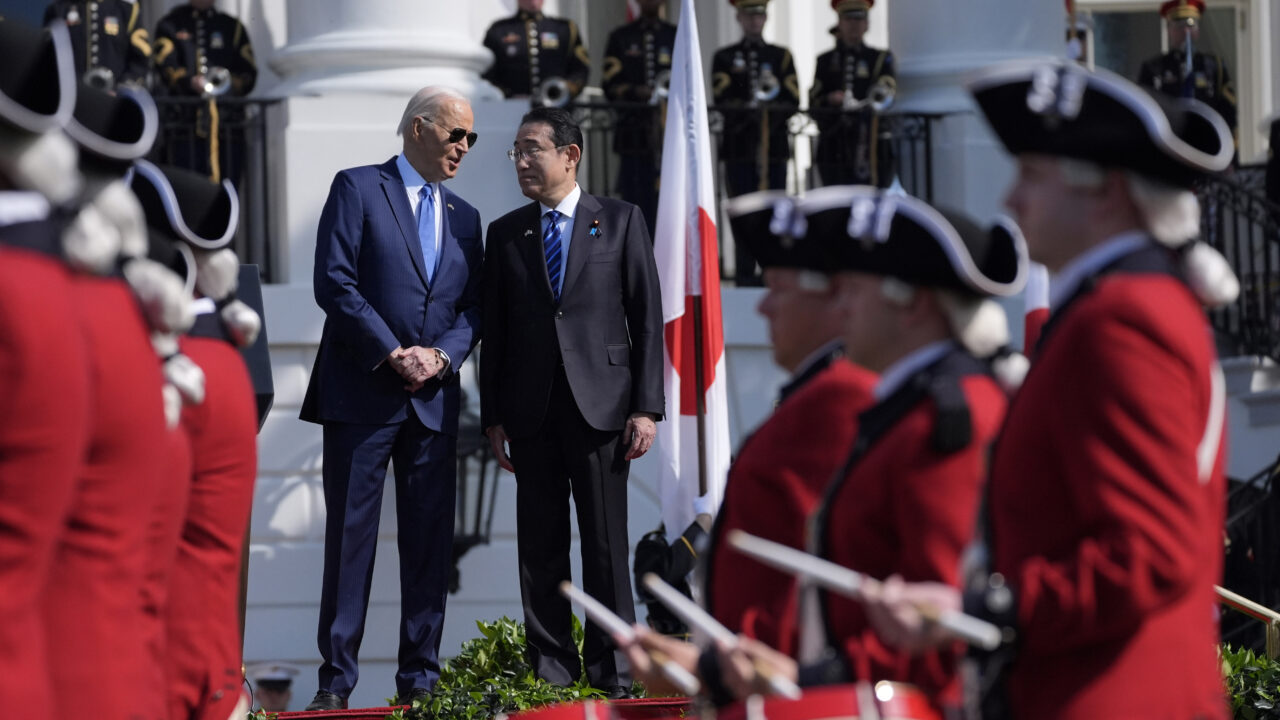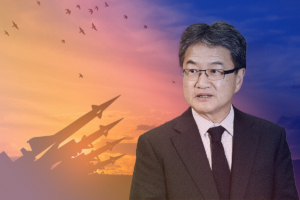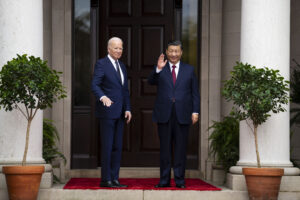The White House Summit With Japan and the Philippines Is a Big Deal
The celebration of a "categorical leap” in Japanese rearmament risks inflaming tensions in the Pacific. President Joe Biden and Japanese Prime Minister Fumio Kishida watch the United States Army Old Guard Fife and Drum Corps during a State Arrival Ceremony on the South Lawn of the White House, Wednesday, April 10, 2024, in Washington. (AP Photo/Evan Vucci)
President Joe Biden and Japanese Prime Minister Fumio Kishida watch the United States Army Old Guard Fife and Drum Corps during a State Arrival Ceremony on the South Lawn of the White House, Wednesday, April 10, 2024, in Washington. (AP Photo/Evan Vucci)
The White House is rolling out the red carpet for Japanese Prime Minister Fumio Kishida, who arrived in Washington Tuesday for meetings with President Joe Biden followed by a state dinner Wednesday. The pair will be joined Thursday by Philippine President Ferdinand Marcos Jr. for the first ever trilateral summit between the United States, Japan, and the Philippines.
The summit is a significant step up in cooperation between the states, as the leaders look to increase their economic cooperation and collaboration on technological development. But the real show is all about security in the Indo-Pacific, as China becomes more assertive in its claims over disputed territories in the South China Sea and North Korea steps up its missile testing in the region.
As the trio works to bolster security in the region, they’ll face the daunting task of balancing military efforts with diplomatic overtures needed to keep tensions with China in check, experts say. Improving U.S.-China relations will stabilize the situation, Mike Mochizuki of George Washington University said, adding that “focus on military deterrence is likely to cause China and North Korea to then respond in such a way [as] to beef up their security interests.”
A step up for U.S.-Japan relations
Mochizuki, who is also a non-resident fellow at the Quincy Institute, told RS that Biden and Kishida are expected to discuss ways to further increase their military cooperation, an effort that has been expanding incrementally for the last few decades.
Japan maintained restraints on its defense spending and development for decades after the end of World War II, keeping in line with its pacifist policies. But by the 1980s, Japan began relaxing those restraints to collaborate more with the U.S. on shared security interests, an effort that has continued to the present day.
“This summit is in a sense a celebration of this shift.”
Japan has since been building up its defense capabilities, acquiring new weapons systems and reinterpreting the constitution in 2015 to expand Tokyo’s ability to use force in defense of its allies such as the U.S. The result has been the most significant increase in Japan’s military capabilities since World War II, and a deepening of U.S.-Japan relations, Mochizuki said.
“This was a categorical leap,” he said. “This summit is in a sense a celebration of this shift.”
Biden and Kishida are expected to announce plans to further strengthen their defense cooperation and production, which includes plans for the creation of a bilateral council that will be consulted on points of collaboration.
The U.S. will also reportedly appoint a four-star general to command U.S. Forces in Japan, which are currently led by a three-star general, a rank with less authority in dictating operations. The upgrade would empower U.S. Forces in Japan to make more strategic decisions and carry out military exercises, allowing for a more unified U.S.-Japan command.
The summit also marks a strengthening of relations between the U.S. and the Philippines. The U.S. has become more closely aligned with the Philippines since Marcos Jr. became president in 2022, cementing a noticeable shift from predecessor Rodrigo Duterte’s position on Washington.
The U.S. and the Philippines are allied by a mutual defense treaty. So while the U.S. has maintained a military presence in the Philippines, China’s increasingly hostile actions against Philippine vessels in the South China Sea have prompted closer collaboration between the two countries. In 2023, Biden and Marcos Jr. announced a pact that would give the U.S. access to additional military bases on the islands as tensions in the surrounding seas mount.
The threats have become increasingly apparent in the Second Thomas Shoal, a waterway that China claims as its territory but that falls within the Philippines’ exclusive economic zone, established by the U.N. Convention On the Law of the Seas. In response to recent attacks on Philippine boats in the shoal, the U.S. and Japan have stated their support for the Philippines, and Manila has warned Beijing that it is prepared to take actions that are “proportionate, deliberate, and reasonable.”
Biden will meet with Marcos Jr. separately on the second day of the summit. In a statement, White House Press Secretary Karine Jean-Pierre said they will discuss how to “expand cooperation on economic security, clean energy, people-to-people ties, and human rights and democracy” as well as reaffirm “U.S. commitment to upholding international law and promoting a free and open Indo-Pacific.”
China’s ‘deep suspicion’
Experts worry that the summit risks escalating tensions in the region if too much emphasis is placed on military deterrence as opposed to diplomacy. If the U.S. and its allies continue to bolster military activity in the region, especially in the South China Sea and near Taiwan, China could perceive this as a threat, said James Park, a research associate at the Quincy Institute, which publishes Responsible Statecraft.
“None of these alliances directly say, ‘these are intended to deter Chinese invasion of Taiwan,’” Park said. “But from China’s perspective, China has to be looking at these developments with deep suspicion.”
These security concerns are clearly a motivation for the meeting, Mochizuki argues. The U.S. and its allies, he says, are signaling to potential adversaries — including China, North Korea or even Russia — “that the United States remains committed to the security of the region, that various allies and like-minded countries are stepping up to the plate to contribute more to security.”
The tripartite structure of the summit solidifies a shift from past U.S. policy. Previously, the U.S. maintained a series of bilateral partnerships with states in east Asia. But for the past few years, the U.S. has engaged in trilateral meetings such as this one that pull countries together as more of a network. In 2022, Biden hosted a trilateral meeting with Kishida and South Korean President Yoon Suk Yeol. In 2021, the U.S. formed the AUKUS trilateral security partnership with the United Kingdom and Australia to develop defense interests in the Indo Pacific.
“From China’s perspective, China has to be looking at these developments with deep suspicion.”
While the efforts create positive possibilities for collaboration, Mochizuki says the region could face further divisions if these networks of alliances do not place more emphasis on diplomacy with countries they have tensions with, such as China.
“The net effect of this is not so much a stable peace, but a deepening geopolitical divide between the U.S.-allied network on the one hand, and China, North Korea and Russia on the other hand,” he said.
Mochizuki says more emphasis on de-escalatory diplomacy is needed to bolster cooperation. For the U.S. and Japan in particular, this means being careful to not signal any shift from the long-standing policy of “strategic ambiguity” under which Washington balances China-Taiwan tensions by suggesting that it may defend Taiwan in case of an invasion without ever committing to do so. This careful equilibrium aims to deter both Chinese aggression and any sudden Taiwanese effort to declare formal independence.
Park adds that preventing escalation will require making repeated assurances to China that the U.S. will adhere to its support for the One China Policy that was agreed upon when Washington and Beijing normalized relations in the 1970s. U.S. officials will also have to be careful to not contradict those assurances with their actions, Mochizuki added, citing then-Speaker Nancy Pelosi’s visit to Taiwan in 2022 as an example. “That was highly provocative,” he said.
The U.S. has made progress on that front by meeting with Xi, “but that was just the beginning,” Mochizuki said. “There still needs to be a lot more work done to actually improve U.S.-China relations.”
Your support matters…Independent journalism is under threat and overshadowed by heavily funded mainstream media.
You can help level the playing field. Become a member.
Your tax-deductible contribution keeps us digging beneath the headlines to give you thought-provoking, investigative reporting and analysis that unearths what's really happening- without compromise.
Give today to support our courageous, independent journalists.






You need to be a supporter to comment.
There are currently no responses to this article.
Be the first to respond.